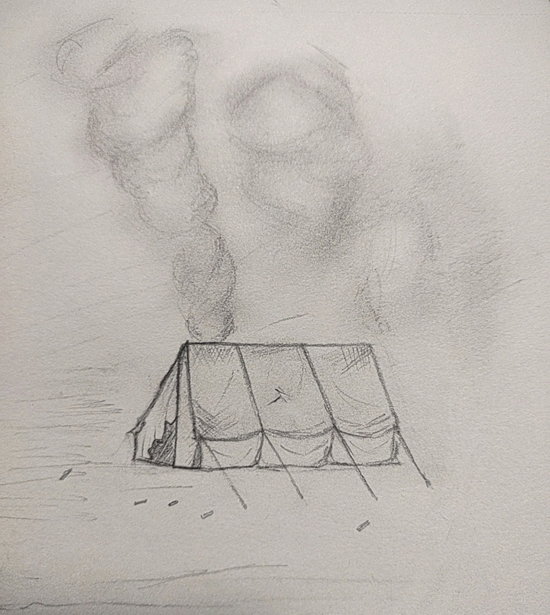Tigrayan Tents
Laura Swart
December 2022
 Drawing by Kalkidan Solomon
Drawing by Kalkidan Solomon
NGO Compound
1.
G’s father was shot yesterday.
And a family of seven,
shot dead at a checkpoint.
Public busses,
bombed—
black metal skeletons strung out
over the roadway,
the green valleys
clasping them
like a mother might.
A refugee camp
outside our compound
was raided—
hundreds of people hiding in ditches
just outside,
just beyond the walls.
At night I listen to the wild dogs
and machine guns,
yelping and hungry, both.
And I hear crickets—
or are those the sobs of mothers and fathers?
2.
I sit under a shady tent on
leafy branches woven into
a soft green carpet.
A woman is making coffee;
she lifts the pan of smoking beans
and kneels before me.
I close my eyes and with my fingers
fan the smoke
into my mouth and nostrils.
I breathe in the earthy aromas of ginger and cinnamon,
and breathe out bullets and blood and butchery.
3.
A boy approaches me in the courtyard.
Will you come to my home for dinner? he asks.
I follow him to a tiled door, high and mustard yellow.
His mother greets me,
then his grandmother,
then his father, eyes warm like goat’s milk.
Father leans his head into my shoulder,
kisses my neck,
and brings a bowl of water with a pitcher.
I wash. He serves
curdled milk,
meat marinading in a crimson sauce,
breads, injera, shiro, and beer.
I’m not afraid of war, he says.
When the bullets come,
I can run in the other direction.
But I am afraid of hunger.
When hunger comes,
there’s nowhere to run.
The creases about his mouth
reach down into the green hills of Tigray
and take from them
fertile memories,
now glutted and disfigured by tank tracks
and loamy earth lying about in clumps,
like fistfuls of hair pulled from a cancerous scalp.
Tigrayan Tents
The shelling started in Shire at dawn.
Dust and earth, stirred by bullets
rose up into clots of fury:
old women and little girls,
raped;
old men, young men
pulled from their homes,
shot dead—
and the clots of dust became their grave.
I and my mother waited in the cellar,
huddled in a corner.
We prayed
and listened to the screams of our neighbours.
We listened to pounding feet
and gunfire;
we listened to chokes and sobs.
Water, power, and telecommunications were shut off,
roads were blocked,
and every vestige of our past and present was destroyed—
mosques and churches and schools,
artifacts and factories,
health care and cultural centers.
They took our animals,
they even took our seeds—
our seeds that bring the harvest.
By noon it was quiet.
I heard neighbours speaking in quiet voices,
so I ventured out.
I saw military men waving flags,
I saw big tanks,
I saw bodies.
A soldier stopped me.
Where are you going?
I choked with terror.
Don’t worry; we won’t hurt civilians. We’re here to kill your leaders.
We’re going to eat them alive and destroy this town;
we won’t leave a building standing.
He extended a palm with a roll of biscuits.
Would you like one?
I edged away, afraid he would shoot,
afraid of the bodies raked to the side of the road.
And then, like guerillas,
Tigrayan forces emerged from tents
pitched deep in the mountains
and entered the fight.
Systematic and strategic,
impalpable as ghosts,
they fight for our tattooed necks and hands,
for the ornate crosses inked into our foreheads,
for the vertical lines cut deep into our eyebrows.
They fight for our language, our history, our culture—
so that one day,
we will rest in the tall African grasses
and enjoy again the sweet mangos of life.
◊
Laura Swart is a novelist, poet, and playwright. She has taught creative and critical writing to adults for over thirty years, encouraging students to find and raise their writing voices. Her humanitarian work around the world—most recently in Ethiopia and Ukraine—have shaped her thinking, her teaching, and her writing.
Kalkidan Solomon was born in Eritrea and moved with her family to Uganda, where she grew up. She’s interested in art in any form, whether on paper, 3D, architecture, or even words in poetry.
Laura Swart and Kalkidan Solomon both live in Calgary, Alberta, Canada.
